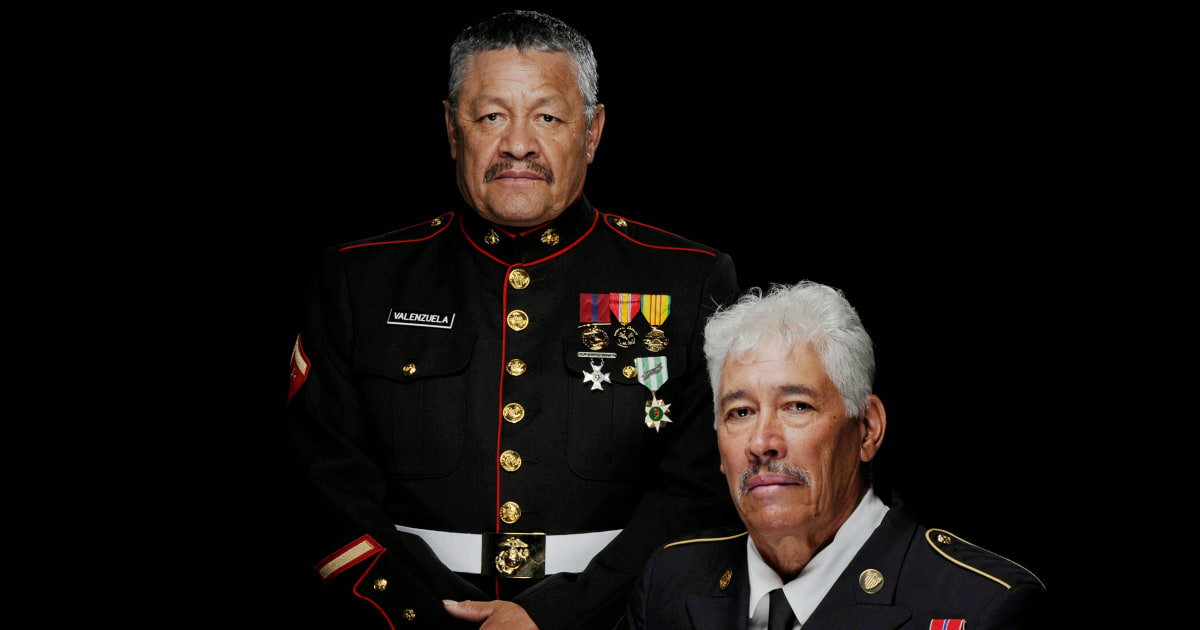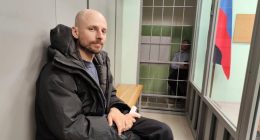
During the Vietnam War, one of Valente Valenzuela’s grim tasks in the Army was collecting body parts from the battlefield, and then taking them to the dump. The young soldier experienced unimaginable horrors during his tour of duty. Once, to save his own life, he was forced to decapitate a violent terror suspect.
Valenzuela describes this ordeal as well as the one that would alter the course of his and his brother’s life decades after the war in Vietnam ended in a new documentary, “American Exile,” which explores the plight of deported veterans and their families.
In 2009, Valenzuela and his brother Manuel, a Marine Corps veteran who also saw combat in Vietnam, received notices that the U.S. government was moving to deport them.
Airing Tuesday on PBS, the film follows the Valenzuela brothers — now both in their 70s — as they fight to stay in the only country they have ever known. Valente goes into exile in Mexico, while Manuel becomes an activist and takes their cause all the way to the White House.
Receiving a deportation notice was overwhelming for Valente. “There’s no word for how we feel. The last thing we think when we go to bed is we’re in removal notice. And the first thing when we wake up, is we’re in removal notice.” In the film, he calls their situation, and that of similar veterans, “shameful for America.”
About 65,000 foreign nationals, mostly green card holders, serve in the U.S. military at any given time, the film notes. “For most of U.S. history, we never deported veterans, although foreign nationals have been serving in the military since the Revolutionary War,” said “American Exile” director John J. Valadez. “Veterans always had a special status.”
Valadez sees the Valenzuela brothers’ saga as “a story of hope” that shows how individuals can effect change. It is a story not without its dark points, however; viewers see Valente toss his medals into the Rio Grande in frustration.
Manuel, who travels the country raising awareness for deported veterans, said that everyone he encounters is shocked by what is happening. “To this day, most people don’t know that the U.S. deports veterans. People always ask me, ‘Are we really doing this?’”
Until recently, the answer was “yes.”
The genesis of the Valenzuela brothers’ immigration troubles goes back to 1996 when then-President Bill Clinton signed the Illegal Immigration Reform and Responsibility Act. “This law made more crimes, including relatively minor ones like shoplifting and possession of marijuana, grounds for deportation,” said attorney Mariela Sagastume. “It took away judges’ discretion to consider military service, community ties, family ties and other mitigating factors in deportation cases. It was also retroactive, meaning that someone could be ordered out of the country for crimes they had literally committed decades ago.”
That’s what happened to the Valenzuela brothers.
When they initially returned from Vietnam, readjusting to civilian life proved difficult. Valente pled guilty to several misdemeanors, including assault and theft. Manuel’s misdemeanors included battery and resisting arrest. Both brothers were later diagnosed with post-traumatic stress disorder and classified as disabled. Still, over the years they were able to rebuild their lives and live with stability — until they received the orders of removal for the acts they committed as young men.
Sagastume said that it is a misconception that serving in the U.S. military automatically confers citizenship. “Very often, service members are assured that all of their citizenship paperwork will be taken care of (by the government).” In fact, noncitizen veterans must still go through the naturalization process.
Along with other lawyers and nonprofit groups, Sagastume has represented the Valenzuela brothers pro bono. She has worked on other deported veteran’s cases, such as that of Hector Barajas-Varela, a veteran who was able to return home in 2016 after receiving a pardon from California’s governor.
“They were discarded”
There is no official tally of the number of veterans that the U.S. government has deported, because immigration authorities do not keep statistics on military service of deportees. Most deported veterans are sent to Mexico, although some have been sent to Jamaica, South Korea, the Philippines and Nigeria.
The veterans sent to Mexico are often not familiar with the country, said Jan Ruhman, a Marine Corps veteran and veterans’ advocate based in San Diego. “Some of them do not speak Spanish. They are usually released onto the streets of Tijuana at night with no money, no phone, nothing.” Some deported veterans are reduced to homelessness or develop serious substance abuse problems. Some have passed away. “They are sitting ducks for the cartels, who threaten them with violence if they don’t join their criminal gangs.”
“The phrase ‘Thank you for your service’ really rings hollow when you see how the U.S. has treated these veterans,” said Ruhman. “They were discarded.”
Biden begins process for return
In July, President Joe Biden ordered the Department of Homeland Security to begin the process of allowing foreign-born veterans who were deported to return to the U.S. “The Department of Homeland Security recognizes the profound commitment and sacrifice that service members and their families have made to the United States of America,” DHS Secretary Alejandro Mayorkas announced.
“Together with our partner the Department of Veterans Affairs, we are committed to bringing back military service members, veterans, and their immediate family members who were unjustly removed and ensuring they receive the benefits to which they may be entitled,” he said.
Manuel hopes that Biden will be proactive about deported veterans. “He should do an executive order that will pardon the veterans and bring them all home,” he said. “There should not be a department in the government that can violate our rights and not be held accountable.”
Manuel is safe from deportation — for now. He has received administrative closure from the government on his case. But at any time, the administration could file a motion to re-calendar his case, to continue to the efforts to deport him.
“With administrative closure, it is like a pause in the deportation case,” Sagastume said. “In a sense, you are still in limbo.”
Although lawmakers like Sen. Tammy Duckworth, D-Ill., have introduced legislation to help deported veterans and their families, so far nothing has been been passed to offer them permanent relief.
Sagastume said that veterans like Manuel Valenzuela and Hector Barajas-Varela won relief in part because they were able to generate media attention. “The left and the right both respect veterans, they say, so Congress should act to do something for them permanently.”
“It has been a privilege to know these men. They are like family; I consider them heroes,” she added. “I will keep fighting for them and speaking out until every deported veteran is brought back.”
Follow NBC Latino on Facebook, Twitter and Instagram.
Source: | This article originally belongs to Nbcnews.com









